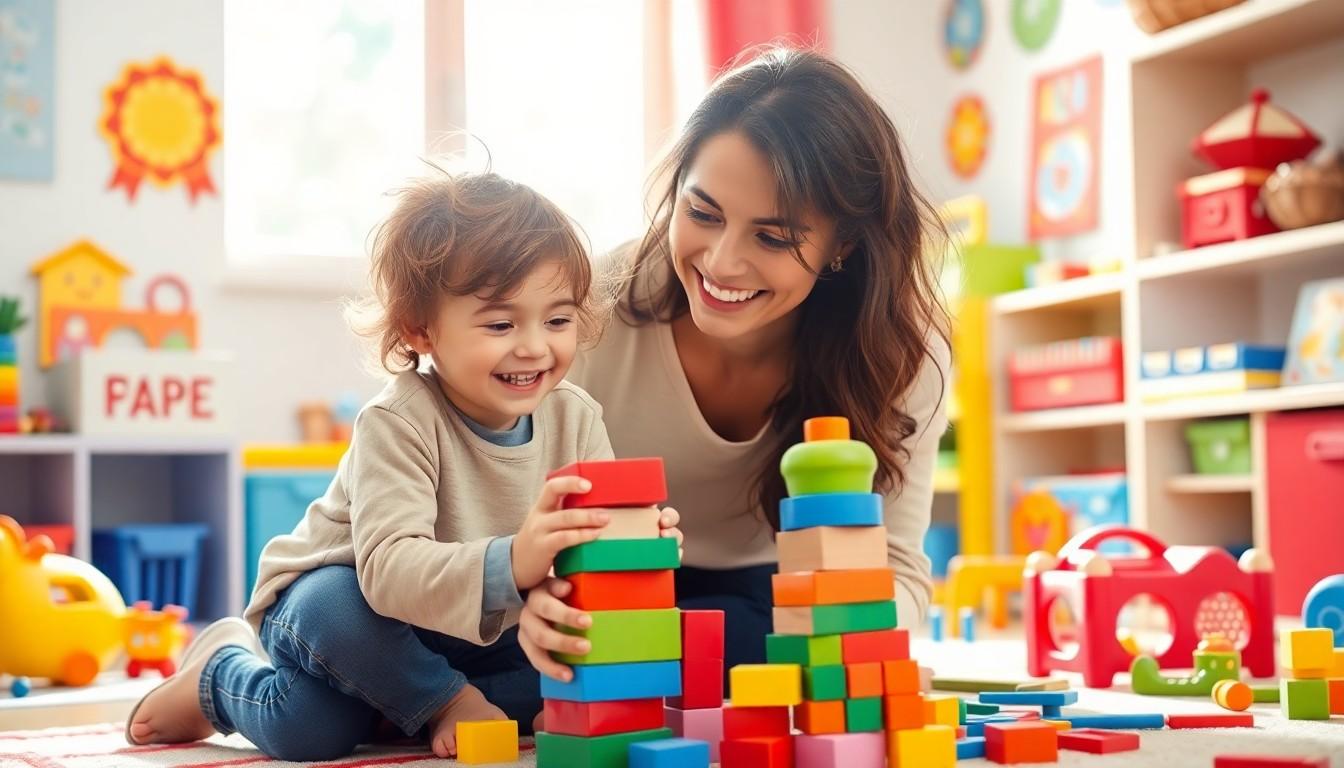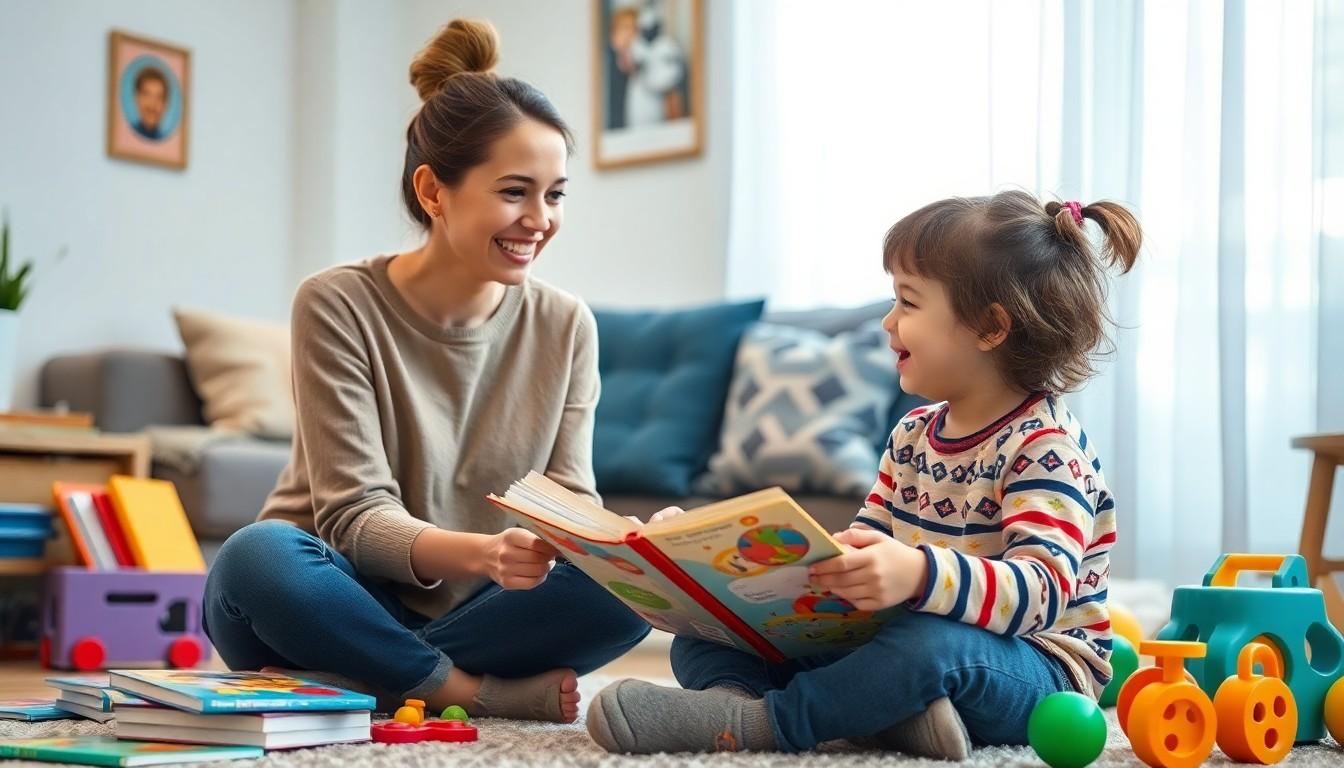Physical Address
304 North Cardinal St.
Dorchester Center, MA 02124
Physical Address
304 North Cardinal St.
Dorchester Center, MA 02124

Navigating the wild world of preschoolers can feel like trying to herd cats—adorable, chaotic, and often unpredictable. Every day brings a new challenge, from negotiating snack time to deciphering the latest in toddler-speak. But fear not! With the right tools and a sprinkle of humor, parents can turn these tiny tornadoes into delightful little humans.
Understanding preschool development is crucial for effective parenting. Each child progresses at their own pace, but certain key areas highlight development during this stage.
Preschoolers achieve several important milestones. They typically demonstrate enhanced language skills, with vocabulary expanding to around 1,000 words by age 4. Cognitive skills also develop rapidly; most children can recognize basic colors and shapes by 3. Physical abilities show notable growth, as many can skip, hop, or balance on one foot by age 5. Socially, sharing toys and playing cooperatively with peers becomes common around this age. Understanding these milestones helps parents identify areas of support as children navigate preschool years.
Emotional and social growth poses opportunities for learning. Preschoolers often express a wide range of feelings, including joy and frustration. Recognizing feelings in themselves and others emerges around age 4. Developing friendships becomes a focus, and children learn sharing and turn-taking through play. They begin to understand rules in games and respect boundaries set by caregivers. Parents can encourage this growth through interactive play, validating emotions, and modeling empathy. This emotional intelligence lays the groundwork for healthy relationships and resilience in the future.

Effective communication forms the foundation of parenting preschoolers. Creating a supportive environment fosters understanding and connection.
Active listening enhances communication with preschoolers. Focus on eye contact and body language to show engagement. Encouraging the child to share thoughts promotes deeper interactions. Reflecting back what the child says assures them that their feelings matter. Asking open-ended questions sparks curiosity, allowing for more in-depth conversations. For instance, saying, “What did you enjoy most at school today?” invites them to elaborate. Providing feedback by acknowledging their feelings fosters trust and encourages children to express themselves.
Encouraging expressive language builds vocabulary and confidence. Offering choices helps children articulate preferences. Phrasing options as “Would you like an apple or a banana?” prompts them to respond. Introducing new words during play enhances language skills in a fun context. Reading together regularly exposes children to diverse vocabulary. After reading a story, asking questions about characters and events stimulates discussion. Singing songs and nursery rhymes reinforces language rhythm and pronunciation. Affirming their attempts at communication supports ongoing dialogue and growth.
Creating a nurturing atmosphere for preschoolers allows for healthy development and emotional security. Parents can employ effective strategies to foster this environment.
Establish a safe space to nurture a child’s exploration. Keep sharp objects and hazardous substances out of reach. Breakables and choking hazards should also be removed. Create areas designated for play and learning. Use soft furnishings to reduce potential injuries. Encourage independence by allowing children to navigate their surroundings safely. Regularly check the space for new hazards as children become more mobile. Utilize child-proof locks on cabinets and gates for stairways to enhance safety further. A secure environment provides peace of mind for parents and freedom for children.
Implementing a daily routine promotes stability for preschoolers. Consistent schedules help children know what to expect throughout the day. Morning rituals, mealtime procedures, and bedtime routines provide structure. Utilize visual aids like charts or pictures to illustrate the routine, helping children understand transitions. Reinforcing positive behaviors during routine activities strengthens learning. A predictable environment fosters emotional security, which is crucial for their developmental growth. Simplifying choices within routines aids decision-making and boosts confidence. Routines not only benefit children but also assist parents in managing daily tasks efficiently.
Discipline and guidance play crucial roles in shaping preschoolers’ behavior. These strategies foster a supportive learning environment while promoting positive social interactions.
Positive reinforcement encourages desirable behaviors by acknowledging and rewarding them. Praising a child for completing tasks, sharing toys, or using polite language reinforces such actions. Offering tangible rewards, like stickers or extra playtime, motivates preschoolers to repeat these behaviors. Additionally, a simple “great job” speaks volumes. This technique builds confidence and nurtures self-esteem. Parents should consistently apply this method, ensuring that praise is immediate and specific. By making children aware of their accomplishments, they develop a clear understanding of expectations and boundaries.
Establishing clear boundaries helps preschoolers understand acceptable behaviors. Parents should communicate rules in a straightforward manner. For instance, stating that jumping on furniture is not allowed creates a clear expectation. Consistency is key; parents must enforce these rules regularly. When a child tests the limits, calmly reminding them of the boundaries helps reinforce understanding. Visual aids, like charts, can illustrate rules and daily expectations. Providing choices within boundaries, such as selecting a snack within a list of healthy options, fosters independence while respecting limits. This approach empowers children, making them feel secure and guided.
Engaging preschoolers in learning can occur through various activities that stimulate their curiosity and creativity. These interactive experiences promote skill development while ensuring enjoyment.
Educational games foster critical thinking and problem-solving skills in preschoolers. Incorporating board games encourages turn-taking and following directions, which promote social skills. Puzzles build spatial awareness and cognitive abilities, while simple math games reinforce counting and number recognition. Outdoor games like scavenger hunts introduce concepts of nature and teamwork. Additionally, role-playing activities allow children to explore different scenarios and develop empathy. Children benefit greatly from games that merge fun with learning, making educational concepts easier to grasp and remember.
Arts and crafts activities enhance creativity and fine motor skills in preschoolers. Providing supplies like crayons, scissors, and glue sparks imagination. Drawing and coloring encourage self-expression, while cutting shapes fosters hand-eye coordination. Projects like making collages or simple sculptures allow children to experiment with different materials. Engaging in seasonal crafts connects children to the world around them and nurtures their awareness of holidays and events. Such creative activities not only support artistic development but also promote cognitive growth through planning and execution.
Parenting preschoolers can be a delightful yet demanding journey. By embracing effective strategies and maintaining a sense of humor, parents can navigate the ups and downs with confidence. Understanding each child’s unique developmental pace is crucial for fostering their growth and emotional intelligence.
Creating a positive environment encourages exploration and learning, while consistent routines provide the stability preschoolers need. Positive reinforcement and clear boundaries help shape behavior, allowing children to thrive. Engaging activities stimulate curiosity and creativity, making learning both fun and impactful.
With the right approach, parents can cultivate a nurturing atmosphere that supports their preschoolers’ development and strengthens their bond.